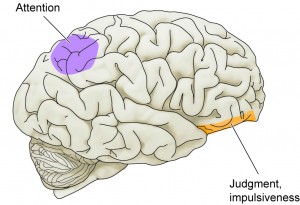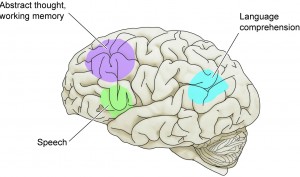People who have been exposed prenatally to alcohol often exhibit deficits with “executive functions”. Executive functions are a cluster of processes involved in “the ability to plan and guide behavior to achieve a goal in an efficient manner” (Kodituwakku, Kalberg, and May). In order to carry out an assignment at school, students must organize and order their behavior and actions.
Executive functioning has been defined by Muriel Lezak (McCreight, 1997) as having four major components:
1. Goal formation
2. Planning
3. Carrying out goals
4. Doing so effectively
If the teacher tells the children to get out their math books and do questions one to ten, each pupil must understand this in terms of first getting out the textbook, the exercise book, the pencil, and eraser, and also clearing the desk of anything that is extraneous to the task or distracting. Then the pupil must understand the number of questions to be done in terms of a quantity with a beginning and an end and must make some judgment about how much time to spend on each question. After this, the pupil must begin the work, stay on task, use his or her knowledge of the subject, and finally, complete the task.
(McCreight, 1997).
When an assignment is given, most students are able to get started without consciously thinking about it. However, when the FASD student with executive dysfunction is given an assignment, he/she does not know where to begin. Often, he reacts impulsively before determining his desired goal, planning, and organizing the steps he needs to obtain his goal.
Executive functions are “higher order” processes and require the ability to:
- Delay responding
- Shift between activities flexibly
- Plan for the future
These higher order processes require the integration of several abilities, such as:
- Working memory
- Impulse control
- Organizational skills
- Temporal ordering and sequencing
- Internalizing language
- Mental flexibility
- Attention and effort
Executive functions have been likened to a bicycle wheel, and the many skills (such as the ones mentioned above) that comprise it are the spokes. It is possible that only 1 or 2 spokes are damaged; however, the wheel is affected. FASD students whose executive functions are compromised may have only 1 or 2 of these skills affected, or they may have many skills affected. When executive functions are compromised, learning is disrupted.
The following characteristics describe the FASD student who has executive function deficits in each of the areas listed above:
Working memory
- Forgetfulness – these are the “I forgot” students. (They never had the information in the first place.)
- Difficulty holding information “in their heads”
- Missing chunks of information
- Difficulty remembering multi-step directions
- Can’t keep track of their things
- Forgets supplies, assignments, and books
- Difficulty with mental math
- Difficulty with reading comprehension
Impulse control
- Responds quickly in class without thinking
- Calls out in class
- Acts out in class
Organization
- Has difficulty knowing how to start an assignment
- Has difficulty organizing a plan of action to complete an assignment
- Has difficulty organizing or sequencing written information logically
- Has difficulty seeing the forest through the trees
- Looks anxious and overwhelmed
Time management
- Difficulty judging the order in which assignments need to be completed
- Difficulty estimating how much time it will take to complete an assignment
- Difficulty planning or preparing for future projects
Mental flexibility
- Difficulty with transitions
- Difficulty shifting to a new strategy or a new way to look at something
- Perseverates; gets stuck
Internalizing language
- Lack of using self-talk or reflective thinking
- Difficulty with problem solving
- Difficulty drawing from past experiences
Attention and effort
- Easily distracted
- Difficulty paying attention and maintaining attention
- Difficulty getting started
- Assignments often incomplete